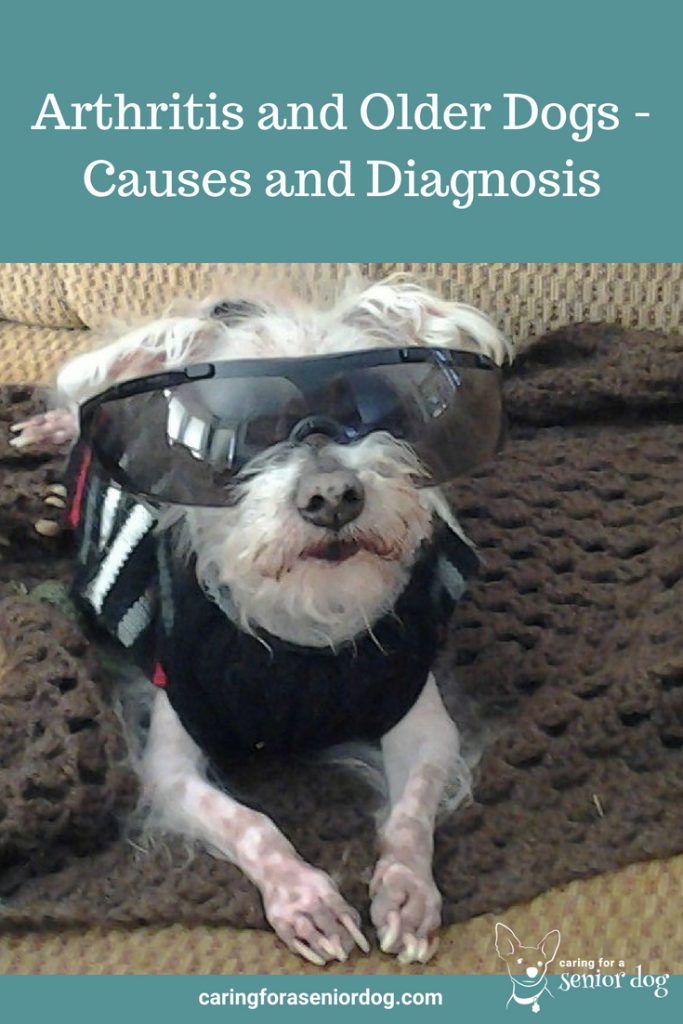
Do you think your senior dog is suffering from arthritis? What signs have you been noticing that have gotten you thinking it’s a possibility? Before you continue here, why not have a read of an article I wrote called “Arthritis in a Dog – What You Need to Know.”
UPDATED JULY 30/18
Causes of arthritis
- Many joint diseases are actually the result of a trauma, or minor injury a dog sustained in the past, even at quite a young age
- Ligament damage, the most common being cranial cruciate ligament in the knee
- Cervical trauma caused by a walker jerking the leash around a dog’s neck in a bid to stop him from pulling, or teach him to walk nicely
- Lack of exercise – dogs need exercise every day, not just on the weekends. Putting an out of shape dog through a lot of physical exertion two days of the week, is an injury waiting to happen
- Abnormal cartilage development
- Dislocated joint
- Rubbing within the joint
- Problems with the development of bone and joint
- Strain on tendons and ligaments caused by excess weight
- Trauma
- Joint infection
- Bone fracture involving a joint
- Ageing and natural wear and tear

Diagnosing arthritis
You’ve seen some of the signs of arthritis in your dog, and you know the many factors that can cause it, so let’s talk about what to do next. Even if your dog is only limping slightly, I still recommend you take him to the vet. Dogs are good at hiding pain, and if there are treatments to make him more comfortable and ways to make him more mobile, why not!!
Depending on how familiar your vet is with your dog, a whole history of any injuries or traumas may or may not be needed. If you adopted an older dog that history may not be known, so just tell him what you do know.
Once he has finished with his questions he will examine your dog. Your vet will likely listen to his heart, lungs, possibly take his temperature and then he will move his hands along your dog’s body, checking for any painful areas. He will also move your dog’s arms and legs to check his range of motion and if he reacts to anything he’s doing. What happens next depends on how your vet works. Some may want blood samples, x rays and even a fluid sample from within a joint in order to get a complete picture, others will just prescribe pain medication and send you on your way.
I can’t tell you the best approach for you and your dog, we each have different expectations of our vets, but I do recommend you ask questions during your appointment –
- What diagnostic tools does he recommend using to get an answer
- Is each one really necessary
- Must they be done all on the same day
- Is it possible to do one test and see what results come in, then decide on the next step
- How much is this going to cost?
If money is an issue, as it is for most of us, ask if there are less expensive ways to arrive at a diagnosis. Sometimes an examination will be enough to determine it is arthritis, and at least get you started on a treatment plan. You may be able to go back for further tests at a later date.
If your vet has confirmed arthritis, the next course of action will be to devise a treatment and management plan so your dog is comfortable, and has a good quality of life.
Do you know what caused your dog’s arthritis? What tools did your vet use to diagnose him? Sharing helps others so leave a comment below or on my Facebook page.

When i was younger i had a dog. After reading this post, i think that it indeed had arthritis. He had suffered an foot injury while young, and later on in life had trouble stepping on that same foot, all though years have passed since the injury. We never diagnosed him, but it looks like he did have arthritis
Hi Ido, thanks for your comment. Unless we’re really paying attention, arthritis can go undiagnosed for quite some time. Often we just assume it’s part of ageing, and don’t realise it could, in fact, be something else. Hopefully this article will help people figure out what to look for.
Hi Hindy,
This is such a great article. Too many people owns dogs but don’t have the time to spend with them to get the exercise
My dog is not quite senior yet but getting close. However my mother n laws dog is an old little thing with major arthritis throughout his body. I feel so bad for him every time I see him. I will be bookmarking this page and sharing it with her. Thanks for sharing.
Hi Tanya, I’m so glad you found this helpful. Poor little guy! Is your mother in law’s dog on any sort of pain medication, or joint supplement? I know a product called Yumove really helped one of my dogs with his arthritis. Perhaps she can check with the vet to see if it’s appropriate. I will be writing about managing arthritis, and discuss the different types of treatment available. Nice to know these articles are helping people care for their beloved pets.
Hi Hindy
Thanks for a great post. We had 2 Golden Labradors and both of them lived to about 15 years old. They both got arthritis very badly which is why the main reason we put them down at that age.
Is this a common problem with Labradors?
Although I suppose 15 years old is quite a good age for a large dog?
Hi Lynne, Thanks very much for taking the time to comment, so glad you enjoyed the post. Wow that’s a great age for Labs, you obviously gave them a great life! Of course any dog can get arthritis, but larger breeds tend to be more prone due to the added stress on their joints, caused by their size.
My dog is not yet senior but a few years ago he was hit by a car. It wasn’t very serious though and he was back to his old self in a few weeks. According to your article he is in risk of arthritis years to come..hopefully that wont happen..thanks to this post i’ll take preventive measures early enough.
great post!
Hi EMYY, Thanks for commenting, and I’m happy you enjoyed the post. So glad your dog wasn’t injured too badly, and it is interesting to note how something that happens when they’re young, can affect them in later years. Forewarned is forearmed as they say, and I hope whatever measures you and your vet decide upon will help him later in his life.